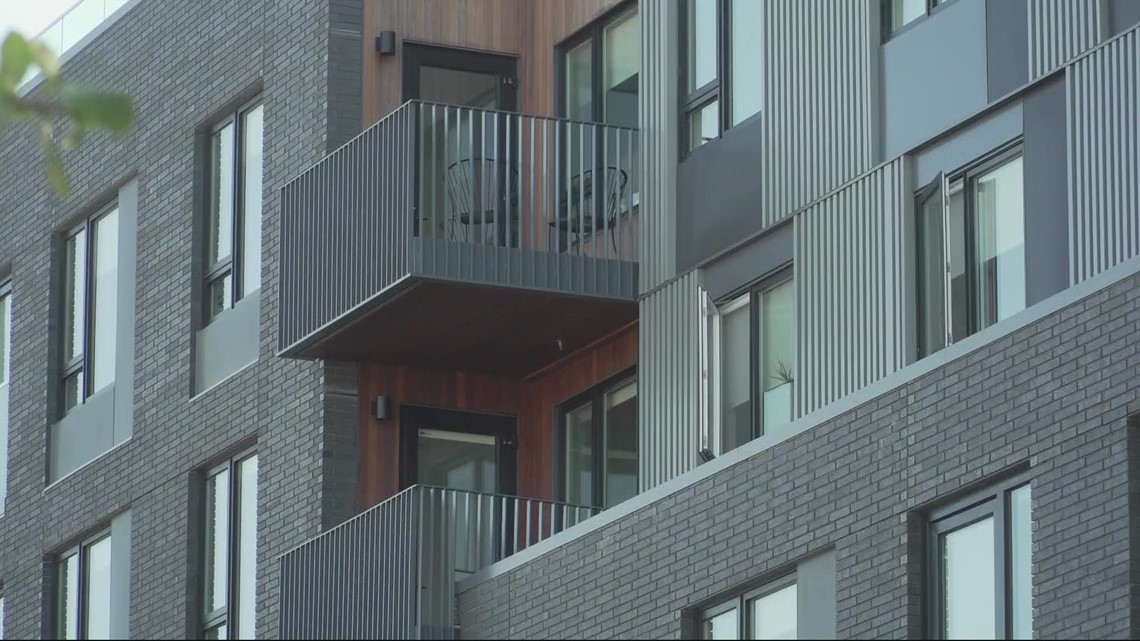PORTLAND, Ore. — Kim McCarty represents 6,000 low-income tenants across the state. As the executive director of the Community Alliance of Tenants, McCarty said their office receives hundreds of calls from tenants who have lost their employment benefits and are still not fully employed — now, they're afraid of being evicted.
Tenants afraid
As of Friday, 45,566 households have applied for rent assistance through the Oregon Emergency Rental Assistance Program (OERAP) — the federally funded $204 million program run by Oregon Housing and Community Services (OHCS).
But the program, which launched in May, has only paid 16,877 households so far, according to data from OHCS.
Oregon's statewide eviction moratorium expired at the end of June but state lawmakers passed a bill providing a 60-day grace period for those who applied for assistance — Multnomah County extended that grace period to 90 days.
According to OHCS, more than 11,000 households are now outside the protection window due to a backlog of applications. The state says its prioritizing those that have been waiting the longest.
McCarty fears thousands of Oregonians are at risk of eviction.
"From a tenants' point of view, we are in a crisis. Thousands of tenants don't have access to the emergency rental assistance that was promised. And we don't have a safety net in place, so people are afraid," said McCarty.
Housing providers frustrated
Housing providers and landlords are equally frustrated.
In some cases, housing providers haven't been paid rent for 18 months. Deborah Imse is the executive director of Multifamily NW, a rental industry group representing a mix of large and small landlords and property managers.
She said providers are in the dark about how the rental assistance process works, where their tenants' applications are in that process and at what point they will get paid. She blames OHCS and said the system is broken.
"After months of moratorium extensions and safe harbors we can see the problem is still not fixed by the agency. If we are going to overcome this problem, we are going to have to have effective agency level results," Imse said.
RELATED: Tenants prepare for unknown as eviction moratorium ends
McCarty and Imse were guests on this week's episode of "Straight Talk."
McCarty agreed the state system for applying for rental assistance is frustrating and needs to be simplified.
"Try to imagine, it's a 27-page application. Much of it written above a 6th grade level. You have to come up with documentation and what if you don't have the right equipment to upload that information? Worst of all, many Oregonians don't even know assistance is available," she said.
OHCS: "We remain laser focused"
In response, Oregon Housing and Community Services said it's working hard to process applications and get payments out the door. So far, the agency has paid out more than $110 million in rental assistance to landlords on behalf of tenants and that rate of payment has picked up in recent weeks.
In a statement, an OHCS spokesperson told KGW:
"We know that time is of the essence for Oregon families who are waiting for their rental assistance applications to be processed. We remain laser focused on preventing renters from being evicted especially as the windows of protection of 60 or 90-days lapses for older applications. Our work is paying off as we are now ranked 6th in the country for state spending (8th previously) in the percent of federal Emergency Rental Assistance (ERA) funds distributed, according to the National Low Income Housing Coalition."
But those numbers mean little to both tenants and landlords.


"There's only one metric that matters"
"While we [the state] may be doing well by that metric, I know tenants and they are not doing well," said McCarty.
"There's only one metric that matters," said Imse, "and that's whether or not that resident who is suffering from housing instability got their rent paid."
Imse said because many of her members haven't received rent for months, they're faced with tough decisions. "They have gone 18 months being leveraged and now we are at a place where they are going to have to have some income or they are going to have to sell in order to pay their bills," Imse said.
Since July, there have been 1,573 evictions for nonpayment filed in Oregon, according to data from the Oregon Law Center. But Imse noted, eviction filings remain much lower than pre-pandemic levels.
A Special Session?
House Speaker Tina Kotek has called for a special session of the Oregon legislature to prevent a wave of evictions.
In response to an article in The Oregonian, Kotek tweeted: "Nothing is more important than keeping people housed. The pandemic and the coming winter demand action now. We need a special session for legislators to fix this problem."
But Imse and McCarty disagreed on the need for a special session.
McCarty and the Community Alliance of Tenants believe it's the only path forward. "Both to give Oregon Housing and Community Services the tools they need to improve the process. [And] to put a pause on evictions to find other safety nets for Oregonians," she said.
Imse said Multifamily NW and its members do not support a special session. She said OHCS has already been given tools and a lot of money, and policymakers have passed tenant protections but the problems still aren't fixed.
"We are genuinely concerned if there is a special session we will be kicking the can down the road and we will be having the same conversation in March. We cannot legislate a solution to a broken software program, we need agency level solutions and accountability, " she said.
Impact on homeless crisis
McCarty wants lawmakers to use a special session to hit pause on evictions with another moratorium.
Otherwise, she thinks the homeless crisis could get worse.
"It doesn't take much to make it worse," McCarty said, "already our social service agencies are at capacity. We don't have an alternative. There is no plan B."
Imse acknowledged the seriousness of the homeless problem but pointed out that it was a problem before the pandemic. She called on lawmakers to address the lack of a safety net with a comprehensive policy for the entire state and fears that policies, like additional moratoriums, could push landlords out of the industry and make the housing problem worse.
"We have to quit leveraging the housing providers because we already have a serious shortage of housing in the state of Oregon. We don't need to exacerbate the problem by having housing providers get out of the industry because they can no longer be in it for the length of time they've been leveraged," she said.
Resources for help
Tenants who need assistance can go to the Community Alliance of Tenants website for help.
You can apply for emergency rental assistance here.
For people who have already received an eviction notice, they can call the Oregon Law Center at 888-585-9638.
Straight Talk airs on Friday at 7pm, Saturday at 8:30pm, and Sunday at 9:30pm.

